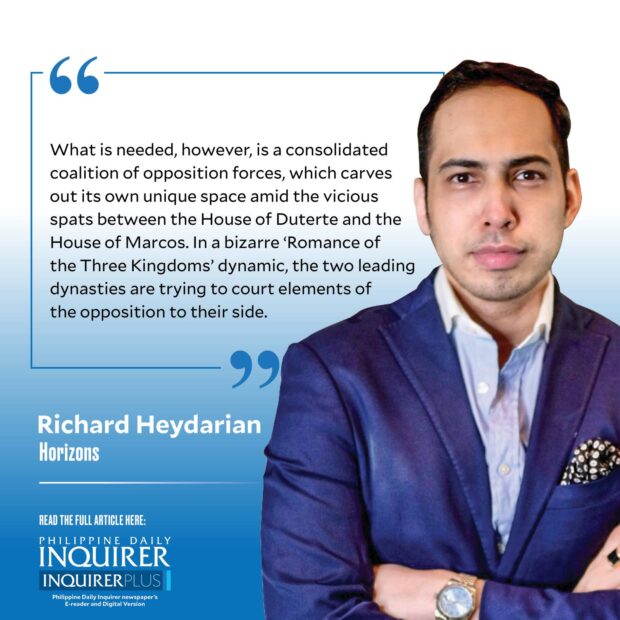Duterte vs Marcos: Where is the opposition?

Tokyo—“You never want a serious crisis to go to waste,” Rahm Emanuel, former chief of staff under the Barack Obama administration, famously argued. “And what I mean by that [is] it’s an opportunity to do things that you think you could not do before.” The 2007-2008 Great Recession provided a unique opportunity for the Obama administration to upend not only America’s financial regulatory architecture but also the country’s broader state institutions.
The jury is still out as to whether America’s first African-American president was anywhere close to instituting truly transformative reforms during his eight-year tenure. But the Obama administration keenly felt the urgency for structural reforms after decades of misgovernance, which eventually fueled the rise of Trumpian populism.
During my recent trip to Japan, I asked a diplomat whether Emanuel, who happens to be America’s current ambassador to Japan, has come up with any new quotable quotes. By all indications, however, my interlocutors were more interested in quotable quotes exchanged between our former and incumbent presidents.
Article continues after this advertisementEven by Duterte’s standards, what the former president did in his infamous Davao rally was bizarrely incendiary. Not only did he accuse the incumbent—who also happens to be his daughter’s “UniTeam” ally—of engaging in illegal drugs-related activities, but he effectively threatened a rebellion that would either topple the current administration or culminate in the secession of Mindanao.
As always, Duterte’s speech was riddled with incoherence and passive-aggressive posturing. It was his typical “stream of subconsciousness.” Nevertheless, his son, “Baste,” who happens to be the current mayor of Davao City, left no doubt as to his father’s message when he called for the “resignation” of the President.
When Sen. Imee Marcos tried to mediate on behalf of her brother and claimed that “apologies” were made by her Davao friends, the young mayor of Davao struck back by warning her against self-styled political posturing and any self-aggrandizing interference.
Article continues after this advertisementFor the first time since assuming office, President Marcos seemed genuinely annoyed, if not angered by his predecessor’s antics. Refusing to dignify accusations that he has/had been using illegal drugs, the incumbent openly questioned the credibility and cognitive coherence of his immediate predecessor: “I think it’s the fentanyl. Fentanyl is the strongest painkiller that you can buy. It is highly addictive and it has very serious side effects, and [Duterte] has been taking the drug for a very long time now …”
For Duterte, now snubbed and disowned by power brokers across Mindanao, the current spat is verging on a political hara-kiri. But this is also bad for Mr. Marcos, who is desperately seeking to rebrand both his own family and the Philippines on the international stage. As some of my inquisitive colleagues in Tokyo implied, our country is looking like a banana republic to foreign observers.
And this, dear readers, brings us to the core of our discussion: Where on earth is the opposition? To be fair, legislators such as Sen. Risa Hontiveros and ACT party list Rep. France Castro have been at the forefront of confronting the worst elements of our political system.
Since her freedom (on bail), former senator Leila de Lima has also reassumed her role as a leading voice of political conscience. Former senator Antonio Trillanes, meanwhile, has been relentlessly exposing the worst elements of the previous Duterte regime. Per former political affairs secretary Ronald Llamas, important meetings among opposition leaders are also taking place.
What is needed, however, is a consolidated coalition of opposition forces, which carves out its own unique space amid the vicious spats between the House of Duterte and the House of Marcos. In a bizarre “Romance of the Three Kingdoms” dynamic, the two leading dynasties are trying to court elements of the opposition to their side.
The true opposition, however, should contemplate a “neither, nor” position focused on three core issues: (i) No to Charter change under suspicious circumstances; (ii) No to Mindanao’s secession and treasonous incitement to rebellion; and (iii) Yes to Philippine government cooperation with the International Criminal Court. A broad umbrella opposition should also have its show of force (no matter how limited) by organizing its rallies for a more democratic and prosperous Philippines.
rheydarian@inquirer.com.ph
















